The Rocky Horror Picture Show: A Cult Classic that Challenged Sexual Mores

“I’m gonna give you some terrible thrills / Like a science fiction double feature”
In 1973, The Rocky Horror Show debuted on the British stage as a campy musical. Only two years later, in 1975, a movie version was released in the United States – renamed The Rocky Horror Picture Show – and while the original release was considered a flop at the time, the movie quickly attained cult status. Forty years after its release, limited midnight showings are still held in college towns, art houses, and other independent venues.
The film is true to its camp theater beginnings and is framed in the style of 1940’s- and 1950’s-era science fiction B-movies. The fact that it is “science fiction” (a gutter genre at the time) is meant to excuse its excesses and weak elements – mainstream audiences were never supposed to take it seriously, and forgive inconsistent plot points and over-the-top costumes and acting. Yet science fiction, by virtue of the fact that it is outrageous and patently “not real,” often uses that license to expose and challenge truths about the social mores of its audience. In the case of The Rocky Horror Picture Show, the lessons are primarily ones of sexual deviancy, and how sexually-oriented fringe communities – such as the ’70s gay pride movement – were seen and portrayed by the mainstream society and how they reacted to that portrayal.
The movie’s plot is paradoxically both simple and ridiculously complicated. Brad and Janet (played by Barry Bostwick and Susan Sarandon), are “two normal, healthy kids” forced to seek shelter in a castle when their car gets a flat tire in a storm. Once inside the castle, they encounter Frank N. Furter (Tim Curry) and his bizarre and gender-bending assortment of servants and guests. Brad and Janet are immediately stripped of their storm-soaked clothing and spend the rest of the movie in their underwear, a symbolic removal of social norms. Over the course of the evening they face many sexual and societal transgressions to which they must adapt. Eventually, they flee the castle in their underwear, barely escaping with their lives.
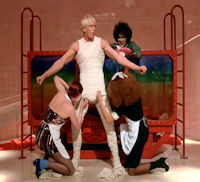
The name Frank N. Furter is a play on words, meant to evoke the slang usage of hot dog synonyms to refer to male genitalia, but also to conjure the allusion of Dr. Frankenstein from Mary Shelley’s novel – for, as Brad and Janet learn, Frank has a lab in the castle where he is creating Rocky (Peter Hinwood), the perfect (male) lover for himself. Rocky, not coincidentally, is “born” in a tank of rainbow-tinted glass, clearly meant as a reference to the Pride Flag, in use by the LGBT community since the early 1970s.
The celebration of Frank’s successful experiment is cut short by Eddie, a failed experiment who escapes from “the vault” and is subsequently killed by Frank. Frank then immediately marries Rocky, but despite retiring to his honeymoon suite with his self-made ideal lover, he still takes time during the evening to visit (and have sex with) both Brad and Janet in their separate bedrooms. Dr. Scott, an old friend of Brad and Janet’s, later arrives at the castle in search of Eddie, who was his nephew before he became Frank’s lab experiment. Eventually it is revealed that all the castle’s inhabitants are aliens; two of Frank’s supposed servants, Riff-Raff (Richard O’Brien) and Magenta (Patricia Quinn), are actually his social superiors, and they kill both Frank and Rocky, and return the castle to its planet of origin.
“Here’s a ring to prove I’m no joker”
The movie begins with Brad and Janet, a happy couple leaving church newly married. In the background a billboard for a new housing development proclaims boldly that the town of Denton is “The Home of Happiness!” Brad stumbles his way through several false starts before bursting into a song wherein he eventually proposes to Janet. His sincerity is supported by the engagement ring he pulls from his suit jacket: “Here’s a ring to prove I’m no joker,” he sings.
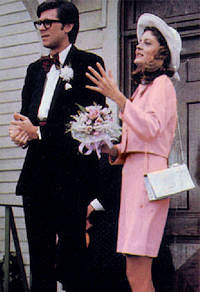
This opening scene is entirely about establishing social norms and customs. Though the movie was released in 1975, the dress and behaviors of the “normal” people attending the wedding are appropriate to an earlier generation: the parents and authority figures of the original 1975 audience. This bygone-era feel is part of the show’s presentation of itself as a nostalgic sci-fi double feature – the opening song references not only George Powell, but also Faye Ray, Flash Gordon and other silver screen classics. But the clash of cultures represented in the movie is a generational as well as a sexual one, and the film mocks the previous generation’s customs even as it embraces the nostalgia of the era.
The newly-married happy couple drive off in a car emblazoned with the shoe-polished words, “She got hers, now he’ll get his!” The joke being, of course, that having achieved marriage – which is presumed to be a woman’s highest goal within this socio-economic group – the new wife will now allow her husband sexual access – which is presumed to be his highest goal. Brad’s offer of a ring is evidence that he is being respectable by the standards of his community; he is not asking Janet for sex without offering social benefits in return. In short, he is proposing a legitimate contract, quid pro quo.
It is for this reason that the viewer can forgive Janet – if she needs to be forgiven – when she later accepts Frank’s advances, for Frank has used his alien technology to disguise himself as Brad. Brad is “no joker;” the contract has been struck. Upon finding out that she has engaged in sexual intercourse with Frank instead of Brad, Janet exclaims, “You’re to fault! You’re to blame! I was saving myself!” Frank replies with a libidinous smile, “Well. I’m sure you’re not spent, yet.”
Frank’s response is another play on words; he is using “spent” in the sexual sense – he thinks there is more sex to be had. It is also, however, a direct reference to the concept of virginity as having a tangible value, even a cash value. By the standards of Janet’s community, an engagement ring is payment for virginity. To Frank, virginity is worthless, possibly even a detrimental quality. With it gone, Janet has more to offer in Frank’s eyes, not less.
“Dammit, I knew I should have gotten that spare tire fixed!”
Janet’s exclamation of Frank’s blame is not the only time the issue of guilt and responsibility arise in the movie; again and again characters face the consequences of straying from society’s accepted behaviors. At the beginning of the film, a narrator character referred to in the credits as “The Criminologist” (Charles Gray) takes pains to explain to the viewer how Brad and Janet came to knock on the door of a spooky castle so far outside their usual environs. Brad and Janet, “two young, ordinary, healthy kids” (emphasis mine) set out to visit a friend one night. “It’s true,” The Criminologist continues, “there were dark storm clouds: heavy, black, and pendulous, toward which they were driving. It’s true also that the spare tire they were carrying was badly in need of some air. But they, being normal kids, and on a night out, well, they were not going to let a storm spoil the events of their evening.”
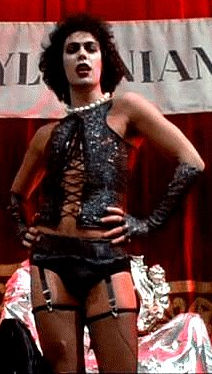
The implication is obvious – inexperienced, headstrong, and foolish, Brad and Janet took risks they should not have taken, and those risks directly contribute to their fate. Step off the path, even innocuously, and the next step could lead you face to face with Tim Curry in drag, surely an intimidating prospect for anyone unprepared.
The themes of fault, blame, and punishment are further illustrated in the example of Eddie (played by Meat Loaf), who bursts from “the vault” where Frank had imprisoned him only to be killed and then subsequently served as the main dish in a cannibalistic dinner for the castle’s inhabitants and guests. Dr. Scott (Jonathan Adams) describes Eddie as being bad even as a child: “When Eddie said he didn’t like his Teddy you knew he was a no-good kid.” Eddie is also described as enjoying rock and roll, porn, and drugs. Brad and Janet eventually leave the castle deflowered and forever altered … but alive. Eddie’s social transgressions and irresponsibilities are far greater, and his life becomes forfeit as a direct result. He is defiled not only in life but also in death.
It is, however, Eddie’s death (and subsequent re-appearance as dinner) which proves to be Frank’s undoing, a transgression for which even he must pay a price. When Riff-Raff and Magenta reveal themselves to be Frank’s superiors instead of servants and announce that they intend to kill him, Brad exclaims, “What’s his crime?!” Dr. Scott answers, “You saw what became of Eddie.”
More subtle, but also a contributing factor to Frank’s demise, is the concept of personal responsibility to one’s lovers and friends. Columbia (Nell Campbell), another servant of Frank’s, laments Frank’s lack of fidelity. “First you spurn me for Eddie,” she says, “and then you throw him off like an old overcoat for Rocky! You chew people up and spit them out again! I loved you!” As Riff-Raff and Magenta threaten Frank with death, Columbia looks on in tears but doesn’t move to save him – she loved Eddie, too, after Frank rejected her. When Riff-Raff finally pulls the trigger and kills Frank, Magenta expresses surprise, saying that she thought he liked Frank, and that Frank liked him. “They never liked me!” Riff-Raff answers. “He never liked me!” Perhaps in the final tally, Frank’s greatest crime was not treating his people with more affection and respect, a societal requirement that – at least in this instance – transcends sexual mores. Even when it is permissible to have casual sex, the movie seems to say, the people themselves should not be treated casually. Even aliens want to be loved and respected as sexual partners.
“Touch me, oh Creature of the Night!”
In his entrance number, the transvestite Frank N. Furter describes himself as “not much of a man by the light of day, but by night I’m a helluva lover.” The character is never seen during the daytime; the plot takes place entirely in the course of a single evening, so the viewer has no way of knowing what sort of contrasts might exist in Frank’s dress or demeanor when the sun is shining. However, to individuals in the audience of 1975 who self-identified as social deviants, this day/night dichotomy would have had an obvious parallel in their own lives: socially-conforming dress and gender performance during the day, followed by an evening of costumed debauchery in clubs. If their own version of “costumed debauchery” was not as wild or uninhibited as Frank’s, they could, perhaps, live vicariously through him for a couple of hours.
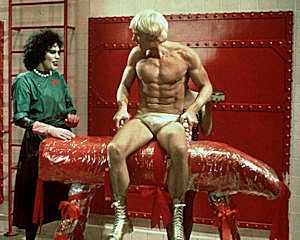
The theme of night is one that comes up repeatedly during the movie. When Janet is encouraging Rocky to have sex with her, she says, “Touch me, […] oh Creature of the Night!” He is, after all, the product of Frank’s mad science – not a born man, but a created one: a creature. If Frank is only “Frank N. Furter” during the night, then “Creature of the Night” is an apt title for Rocky, as “the Night” can be said to be his lineage.
During the movie’s final act Riff-Raff and Magenta discuss returning to their home planet, Transsexual, in the star system Transylvania. Riff-Raff refers to Transsexual’s “moon-swept shores,” and Magenta says, “Sweet Transsexual, Land of Night. To sing and dance once more to your refrain ….” On the planet Transsexual, the viewer learns, it is always night, always the time of sexual power; there is never a need to wear a daylight disguise and pretend to be normal. Riff-Raff and Magenta, aliens who never belonged on Earth, clearly long to return to their home. Despite the camp and ridiculous nature of the plot, the idea of such a world must have been an enjoyable one to the sexual non-conformists in the audience in 1975.
“Society must be protected!”
After exclaiming that Frank should die for what he has done to Eddie, Dr. Scott adds, “Society must be protected!” Eddie’s death serves as a convenient excuse for Frank’s execution, but it is only one reason that Frank cannot be allowed to interact with Earthlings. His insistence upon flaunting sexual custom is a far more insidious crime than mere violence and makes his very presence on Earth a danger.
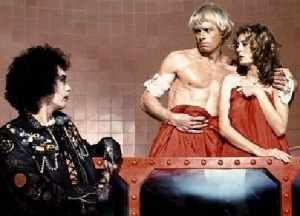
Proof of this danger is seen in the effect Frank has on Janet, who so treasured her virginity – after Frank leaves her bedroom to go to Brad’s, Janet wanders the castle in her underwear, looking for someone else with whom to have sex. She sees a video screen that shows Brad’s bedroom where he and Frank are in bed together, obviously enjoying post-coital bliss, and despite that she has made an identical transgression she cries out, “Oh, Brad! I loved you!” Loved, past tense: Brad is soiled in her eyes, and she cannot forgive him this fault. Instead, she turns to Rocky for the physical interaction she craves, saying, “Now all I want to know is how to go. I’ve tasted blood and I want more. […] Toucha, toucha, toucha touch me, I wanna be dirty.” The metaphoric blood in the water here is from Janet’s broken hymen, but the phrase also evokes predatory behavior – Janet is now a shark, seeking fresh meat.
Even the staid Dr. Scott is not immune from Frank’s corruptive influence. In the movie’s climax, Frank has dressed Brad, Janet, Columbia, and Rocky into clothing and make-up that mirrors his own – after removing their own clothing (and therefore their social identities) early in the film, he remakes them all into his own image. He is Pygmalion; to him, everyone he meets is Galatea. Dr. Scott he leaves mostly untouched, yet during the course of the final song, Dr. Scott is freed from bondage only to discover his legs are no longer under his own control. Formerly paralyzed and confined to a wheelchair because of it, Dr. Scott’s legs – now dressed in fishnet stockings and bright red heels – begin to dance despite his efforts to stop them. Dr. Scott has committed no transgressions of which the audience is aware, but merely being in Frank’s presence has had a deleterious effect. As The Criminologist narrates, “just a few hours after announcing their engagement Brad and Janet had both tasted … forbidden fruit. This in itself was proof that their host was a man of little morals … and some persuasion.” It is this “persuasion” that makes Frank someone from whom society must be protected.
Or, as Riff-Raff puts it, “Frank N. Furter, it’s all over, your mission is a failure; your lifestyle’s too extreme.” The movie celebrates sexual deviancy, but also warns of the dangers.
“Don’t dream it; be it!”
Frank’s final musical number of the movie is the song “Don’t Dream It,” in which he sings the lines, “Give yourself over to absolute pleasure, swim in the warm waters of sins of the flesh. […] Sensual daydreams to treasure forever […] Don’t dream it; be it!”
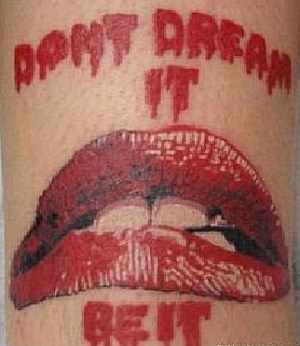
In the nearly four decades since the movie’s release, in thousands of theaters on thousands of nights, audiences have sung these lines along with Frank. For despite the movie’s poor initial reception, Dr. Scott and The Criminologist were correct: Frank’s persuasive influence has proven too powerful to resist, and generation after generation of movie goers have been infected by it. While initially aimed at a hidden sub-culture, the themes of sexual exploration found fertile ground in the progressive 1970s and beyond. Audience participation with the movie has become legend, as viewers – like “normal, healthy” Brad and Janet – cease being passive observers and interact actively with the deviants of the story. En masse audiences quote lines, throw rice and toilet paper at the screen, and add additional dialogue. Someone who has never participated in a Rocky Horror audience is called a “virgin”, and there are additional rules for dealing with such a newcomer. Audience participation has become an elaborate and well-loved ritual.
Cult movies get little recognition in academic or critical circles – they are often cheaply made and considered to be disposable entertainment. But there is nothing “disposable” about The Rocky Horror Picture Show, despite its campy style and obvious narrative flaws. As a piece of film, it is not, perhaps, a shining example of cinematic achievement, but what it lacks in cinematic finesse it makes up for in social relevancy. As a sub-culture touchstone, it reigns as king of the cult movies, and there is no denying its staying power or fanbase. Frank’s lifestyle may be “extreme,” but there are still plenty of movie-goers just waiting to do the Time Warp again.
What do you think? Leave a comment.











OOH! Toucha toucha toucha touch me…I wanna be dirty! I know…”Damn it, Janet!”
Ha! Esp. funny b/c the Janets I know hate this movie, for exactly that reason. I once said, “Dammit, Janet!” to a new Janet and she immediately raised a finger and said, “No. Don’t.”
I wasn’t born yet when this movie was made, but I understand it’s significance in social cinematic history and I’ve grown to love it as one of the best classics out there.
I’m still sort of shocked it has gained the huge, huge cult following it has.
Gotta admit I agree. Never ceases to amaze me, what sticks or doesn’t.
This movie is wonderful. It is getting long in the tooth, yet it is never dated.
Rocky Horror to me was just one long, dull exercise in camp and shock horror that while quite daring 40 years ago, just looks dull and dated now. I’m afraid to say this piece had some good points, but isn’t a film I’d watch again.
If you like cult movie you may thought it’s such a awesome movie like me but if you don’t, you might think it sucks, it’s awful.
I learned many things about the movie I had no clue of. Cheers for an excellent article.
Thanks!
This was really interesting! I didn’t realize some of the messages behind this campy classic, and this article gives me a better appreciation for the film/play. Watching it in the present, I first watched in 2012, is different than when it was first released. Now we are much more sexually liberated, so the film comes across as a cheesy camp show, but it is nice to be reminded that there is a reason behind the madness. Thank you!
Glad you liked it! The first version of this was as a paper for a history class. We were supposed to analyze a movie as part of its socio-cultural place in a time period. I’m actually not a huge fan — have only seen it once — but have always been fascinated by its place in the landscape. It isn’t a _good_ movie, but it’s an important one. One of the reasons I love to study pop culture is because I feel that when millions of people fall in love with a piece of fiction, it’s for a reason. I’m always curious about the why in situations like that: what is that story saying that people are listening to? It’s not always the obvious reasons. As much as RHPS is about “the gay community” (whatever that means at any given moment), it’s also about finding your identity in a changing world, no matter what kind of person you are. I love that about it.
This is still my favorite performance by Tim Curry.
There’s a meme, maybe you’ve seen it: “You can understand a man by what movie he knows Tim Curry from.” I love him here, he makes the movie for me, but I will always think of him as the devil in Legend, which was mediocre in every way but three: Tim Curry’s magnificence, that black dress, and the total commitment Fantasy Air Glitter until it hit Ed Wood-levels of crazy.
And now you know who _I_ am. 🙂
Keep Rocking!
Good stuff! Happy viewing folks!
For those who “don’t understand why people like this movie,” remember its earliest days and remember that this is more than just something to sit back and watch, it’s become an interactive experience, it’s a common ground where the outcasts of society can meet and feel as if they belong.
It a classic but very unusual horror film which shows a lot more than your average dark, gory film.
It’s so bad it’s good.
There are a lot of points where it’s too random to even bother to try and understand but it’s still enjoyable.
Great post. This movie is literally the best thing I’ve ever seen. I’ll change “favorites” through the years but I know that this one will stay forever in my heart, its music, its characters. Everything about this film is simply amazing; and it basically covers every genre possible.
Okay I have watched this movie 40 years after it was made and even now in this modern age it is definitely not like any other musical out there.
Usually I’m a big fan of 1970’s movies (I loved Hair, Go Ask Alice, I Drink Your Blood and Harold & Maude), but this movie just went too far.
I saw this movie once late at night on the TV and recently with a friend at a wonderful open air venue in the summer.
Love it! It can always cheer me up with it’s comical, sexual, and musical vibes.
Brilliant movie with a very inspired and different storyline and a really inspired cast.
This movie peaked my curiosity one night, so I flipped it on VH1 classic, and watched it. It’s just weird!! Nothing makes sense. It’s just a mess of bad acting, inappropriate content, bad writing, bad songs, bad characters, awful special effects, even for 1975, and a weird stupid ending!!!
A classic movie, changed my life. Really important to finding out who I am, helped me discover my personality as a whole. The moment I heard about this movie I fell in love, and the best part is my family made it a huge affair, we all watched it together.
This. It provides a sense of commonality among people who watch it, a true born love for this movie and the entire culture surrounding it.
Invite some friends over to your house, get Doritos, kick back, and watch this.
Monique- thanks for this blast from the past. I play this movie on Halloween when kids come a knocking at the door 😱
It’s a great movie for that! You’re in costume anyway, it’s a fun party movie, and the experience isn’t damaged by repeatedly pausing and answering the door, the way most horror movies are.
May The Rocky Horror Picture Show live forever….
The film is definitely a spoof of B-movies, hammer-style horror films and a general tribute to “giving yourself over to absolute pleasure”. Thank you for the retrospective look.
The hammer-style point is dead on, and I’d never really thought about that before. I was thinking “they made it look like a B-movie” but not which specific style they were aping. Interesting. And now I want to write an article about the Hammer influence in modern cinema… 🙂
This is about as cult as it gets, without actually getting illegal.
What really stands out for me is the fabulous original music by Richard O’ Brien – his song writing is quite excellent!!!
Pure over-the-top camp!!
I’ve watched Rocky more than I can count, and seen two live adaptions.. and its only now I picked up on the rainbow tank having any connection with the LGBT flag. After reading it here, I can’t believe I didn’t see it before.. >___<
YOU'RE A HOTDOG!
This article let me see this movie in a new light. A great movie no matter what angle you look at it from. Great article!
Thanks, Nof!
The costumes remind me of Ellen von Unwerth. Check: prettyandwittyandbrightphotography.wordpress.com/2015/07/11/fashionphotography-ellen-von-unwerth/
After I watched the Show I couldn’t stop Tim Warping in my room…it was amazing.
It’s probably THE best movie ever made.
If you are a movie lover of any sorts then you have got to see this before you die!
This is, in my opinion, the best cult classic out there.
my head is spinning from seeing this movie.
This is one of those cult films.
Very intriguing and interesting article! Well written and well analyzed!
Thanks, Morgan!
Awesome article. I like the observation you make about Janet’s virginity not being “fully spent” yet. Frank N. Furter is a guilty pleasure to watch throughout the movie, as he isn’t deterred by social expectations– but, it seems, that becomes his undoing.
Although, I think the film was great, and the actors captured the analogy of the coming and excepting of sexual deviant. I believe this film was a glimpse into the near future for it’s time. The film is an out look of the gay agenda, indoctrination of changing forced social norms, and mind control in the form of “letting your ambition go” and how far it will go to change the minds of impressionable young people, and society. Those that render this behavior somehow convinces the other person that this is what they wanted along, by liberation and exploration. To ignore traditional ways of life (man and woman) and explore or sample the “sins of the flesh” so to speak is how the world is 40 some years into the future as it is today. To test manhood, except rejection, and make a mindless soulless sex slaves to take to wed seems to be the alien way. As Richard O’ Brien stated…” your mission is a failure, your lifestyle is too extreme.” This is the warning statement to those who think this way of life will prevail.
This is a very well-written article. Very comprehensive to those who wish to understand the film more.
Purely coincidence that Rocky was “born” in a tank with rainbow-tinted glass. The Rocky Horror Picture Show was released in 1975; The first documented use of the rainbow flag to symbolize gay pride wasn’t until 1978.
Hi Monique, interesting and comprehensive article – though I think there is an element of you finding more than was originally there (though that is arguably a fine threshold criteria for a “great” movie / book / song).
After an intense family argument on the subject – I’m with Cory, while apparently plausible in lengthy hindsight – the timing seems to be off by several years, the tank was from “the revenge of Frankenstein”, and the colours more ultra low budget cheesy “special effects” than a gender politics reference (though note the pink triangle on Frank’s surgical robe of course).
Fun, sexy, fabulous soundtrack, horizon and mind expanding – cinema and theatre at its best.
The rainbow was not in use by the gay community in the early ’70s, it debuted in 1978. Therefore, Rocky Horror’s came first (so to speak).